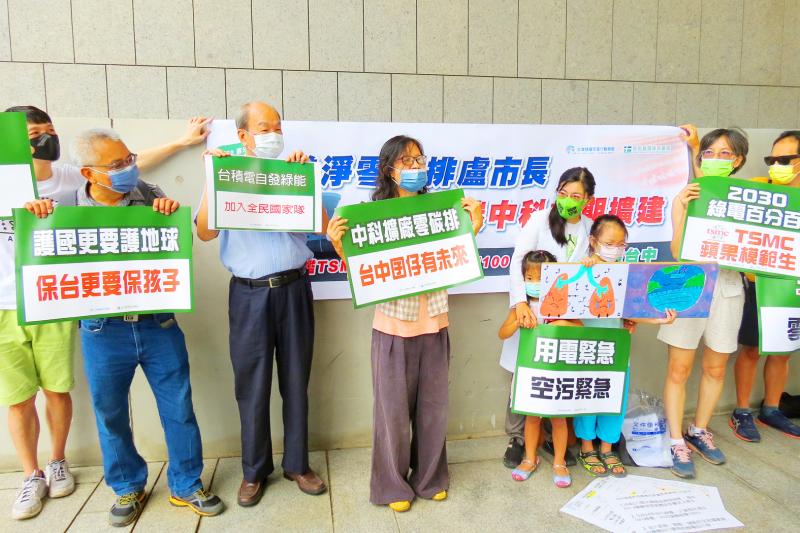While welcoming Taiwan Semiconductor Manufacturing Co’s (TSMC) expansion, environmental campaigners yesterday called on the Central Taiwan Science Park Administration in Taichung to raise the proportion of renewable energy use at the park by 10 percent each year to reach 100 percent by 2030.
TSMC has applied for a phase 6 expansion plan for its facility in Taichung to build a 2-nanometer fab, which is to undergo a second phase of environmental impact assessment next month after being required to submit more documents, Air Clean Taiwan executive secretary Chao Hui-lin (趙慧琳) said.
“We represent many mothers with their families in Taichung, and we support TSMC’s new plan, as the company is the ‘silicon shield’ protecting our nation. However, at the same time, we also want zero carbon emissions to protect our city and our children’s future,” Chao said at a rally in front of the Taichung City Government.

Photo: Su Chin-feng, Taipei Times
“So we request Taichung Mayor Lu Shiow-yen (盧秀燕) to work with TSMC to safeguard Taichung residents in joint efforts to combat global climate change and mitigate local air pollution,” she said.
Chao listed three major demands by environmental advocates: first, slow the pace of the development of its park, which currently producees about 3.51 tonnes of greenhouse gas emissions per year; second, require that at least 40 percent of the energy at the park be derived from renewable resources by 2024, with the ratio increasing by 10 percent each until it reaches 100 percent by 2030; and third, Taichung must join national energy-saving, renewable energy and energy storage efforts, while requiring TSMC to supply all its own energy needs from renewable resources.
“Taichung has experienced power and water shortages in the past few years, which show that all resources are finite, and unlimited production expansion is not possible,” Chao said.
“It is time for the government to guide changes to transform high-investment, high-energy, high-polluting industries, such as steel, to make them more efficient,” said Lai Yi-chun (賴怡均), board member of Taichung Dadu Mountain Air Pollution Clean-Up Association.
The Taichung Environmental Protection Bureau said that at a meeting with TSMC officials at the end of last year, the city government had emphasized the need for the company to have in place more environmentally friendly, renewable energy and recycling programs to manage its water and power supply needs.

‘DENIAL DEFENSE’: The US would increase its military presence with uncrewed ships, and submarines, while boosting defense in the Indo-Pacific, a Pete Hegseth memo said The US is reorienting its military strategy to focus primarily on deterring a potential Chinese invasion of Taiwan, a memo signed by US Secretary of Defense Pete Hegseth showed. The memo also called on Taiwan to increase its defense spending. The document, known as the “Interim National Defense Strategic Guidance,” was distributed this month and detailed the national defense plans of US President Donald Trump’s administration, an article in the Washington Post said on Saturday. It outlines how the US can prepare for a potential war with China and defend itself from threats in the “near abroad,” including Greenland and the Panama

A wild live dugong was found in Taiwan for the first time in 88 years, after it was accidentally caught by a fisher’s net on Tuesday in Yilan County’s Fenniaolin (粉鳥林). This is the first sighting of the species in Taiwan since 1937, having already been considered “extinct” in the country and considered as “vulnerable” by the International Union for Conservation of Nature. A fisher surnamed Chen (陳) went to Fenniaolin to collect the fish in his netting, but instead caught a 3m long, 500kg dugong. The fisher released the animal back into the wild, not realizing it was an endangered species at

The Chinese Nationalist Party (KMT) is maintaining close ties with Beijing, the Democratic Progressive Party (DPP) said yesterday, hours after a new round of Chinese military drills in the Taiwan Strait began. Political parties in a democracy have a responsibility to be loyal to the nation and defend its sovereignty, DPP spokesman Justin Wu (吳崢) told a news conference in Taipei. His comments came hours after Beijing announced via Chinese state media that the Chinese People’s Liberation Army’s Eastern Theater Command was holding large-scale drills simulating a multi-pronged attack on Taiwan. Contrary to the KMT’s claims that it is staunchly anti-communist, KMT Deputy

The High Prosecutors’ Office yesterday withdrew an appeal against the acquittal of a former bank manager 22 years after his death, marking Taiwan’s first instance of prosecutors rendering posthumous justice to a wrongfully convicted defendant. Chu Ching-en (諸慶恩) — formerly a manager at the Taipei branch of BNP Paribas — was in 1999 accused by Weng Mao-chung (翁茂鍾), then-president of Chia Her Industrial Co, of forging a request for a fixed deposit of US$10 million by I-Hwa Industrial Co, a subsidiary of Chia Her, which was used as collateral. Chu was ruled not guilty in the first trial, but was found guilty